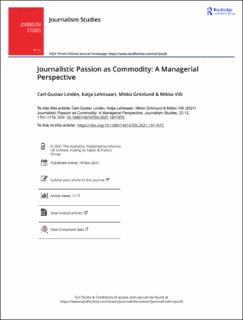Journalistic Passion as Commodity: A Managerial Perspective
Journal article, Peer reviewed
Published version

Åpne
Permanent lenke
https://hdl.handle.net/11250/2979916Utgivelsesdato
2021Metadata
Vis full innførselSamlinger
Sammendrag
This article focuses on the role of passion in news journalism from a managerial perspective. The analysis is based on a data set of 40,621 web-based job advertisements obtained from Journalismjobs.com, from the year 2002 to 2017. The quantitative analysis shows that passion has been on the rise as only 4% of the job advertisements in 2002 asked for “passionate” journalists, increasing to almost 16% in 2013. The authors also performed a qualitative analysis of job advertisements mentioning the word “passion” for the periods 2002–2003 and 2017. These advertisements express a shift from a normative role of journalists to journalism as an activity: when mentioned within the context of personal character, the desired temperament of journalists has given way to descriptions of desired behaviour. The normative focus on journalism as an ideal has decreased while the focus on performance—that journalists should feel passionate about reporting and storytelling—has risen dramatically. In the texts, passion emerges as something that can be applied in a range of contexts as a strategic resource. The findings point to commodification of feelings and exploitation of emotional labour in journalism.
